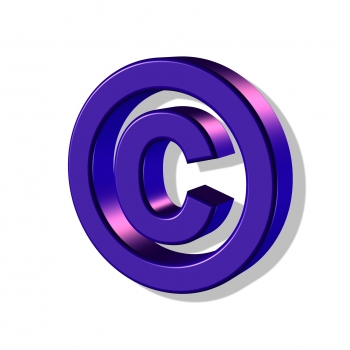Know your rights – ownership of copyright
(Posted on 06/10/21)

If the internet has proved anything, it has demonstrated how difficult it is to protect yourself and your work, and to retain your ‘copyright’. From websites, artwork and literature, to films and music, the internet has made the sharing of text and video file formats as easy as sending an email, or making a phone call. It’s very difficult to protect yourself and your work against copyright. If big names and companies are having trouble with their intellectual property being stolen, then what chance has everyone else?
Right or wrong?
Copyright protects your work and stops other people and organisations from using it without your permission. It’s a type of intellectual property law that gives the owner of the ‘copy’ the exclusive ‘right’ to make copies of the creative work. This is usually for a limited period of time, sometimes known as a licence period.
If the copyright of a piece of work falls out of copyright, then it falls into the public domain and can be used by anyone. For example, if a film or a book becomes ‘public domain’, in theory anyone can make a copy of it and release it for their own gain. Also, if someone wanted to make an adaptation of a novel, they wouldn’t have to pay anyone for the ‘right’ to do so – they would be free to make the adaptation as they wished.
In publishing, if a book goes out of print, and the publisher fails to reprint it in a new edition, the author can in some instances regain the rights to the book and they can publish it themselves – this is known as ‘rights reverted’ and can be beneficial if there is still a perceived demand for the work, but it’s out of print.
Lasting Protection
Copyrighted work can be literature, art, educational or musical in its media. Different countries have different takes on the legislation and the internet further complicates things. These are sometimes referred to as territorial rights.
Your work might be protected by copyright in other countries through international agreements, for example the Berne Convention. The copywrite usually expires 50 to 100 years after the creator dies, depending on the country and its laws. In most countries, copyright lasts a minimum of life plus 50 years for most types of written, dramatic and artistic works, and at least 25 years for photographs, though it can vary for other types of work.
Here in the UK, you get copyright protection automatically – you don’t have to apply for it, or pay a fee – and there isn’t a register of copyrighted works in the UK. You automatically get copyright protection as soon as you create:
- original literary, dramatic, musical and artistic work (including illustration and photography)
- original non-literary written work, such as software, web content and databases
- sound and musical recordings
- film and television recordings
- broadcasts
- the layout and design of published editions of written, dramatic and musical works
To show that the work is yours to publish, you can mark it with the copyright symbol ©, plus your name and the year of its creation. Whether you mark the work or not, it doesn’t affect the level of protection you have. If you type (c) with no spaces on a standard computer keyboard, it will automatically change to the © symbol.
Copyright prevents people from copying your work, distributing copies of it (either free of charge or for sale), renting or lending copies of it, performing, showing or playing your work in public, making an adaptation of your work, or putting it on the internet in any shape or form. There are sometimes fair use rights granted, if the use is of a limited extract, or an excerpt for publicity purposes, but these have to agreed with the owner.
So as soon as we create a work for any of our clients – even this blog article you are reading now – it’s copyrighted and protected from the moment it is written, published and ‘goes live’ to the public.
If you would like to find out more about how Zebra Marketing and Communications can help your business, please contact the team today.







